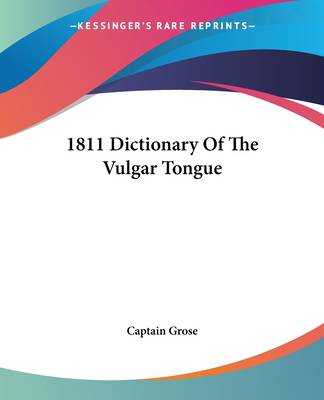
- Retrait gratuit dans votre magasin Club
- 7.000.000 titres dans notre catalogue
- Payer en toute sécurité
- Toujours un magasin près de chez vous
- Retrait gratuit dans votre magasin Club
- 7.000.0000 titres dans notre catalogue
- Payer en toute sécurité
- Toujours un magasin près de chez vous
50,45 €
+ 100 points
Format
Description
The 1811 Dictionary Of The Vulgar Tongue is a comprehensive collection of slang and colloquialisms used by the lower classes in England during the 18th century. The book was compiled by Captain Francis Grose, a British antiquarian and lexicographer, and was originally published in 1785. This updated edition includes additional entries and annotations by Pierce Egan, a popular writer of the time. The dictionary contains over 4,000 entries, each with a definition and example usage. The language is often vulgar and obscene, reflecting the rough and rowdy culture of the time. Many entries relate to criminal activities, such as pickpocketing and prostitution, while others describe the language and behavior of various social groups, such as sailors, soldiers, and gypsies. In addition to its historical value as a record of the language and culture of the lower classes in 18th century England, the dictionary has also been used as a source of inspiration for writers and artists, including Charles Dickens and William Hogarth. It remains a fascinating and entertaining read for anyone interested in the history of English language and culture.The knees. To bring any one down on his marrow bones; to make him beg pardon on his knees: some derive this from Mary's bones, i.e. the bones bent in honor of the Virgin Mary; but this seems rather far- fetched. Marrow bones and cleavers; principal instruments in the band of rough music: these are generally performed on by butchers, on marriages, elections, riding skimmington, and other public or joyous occasions.This scarce antiquarian book is a facsimile reprint of the old original and may contain some imperfections such as library marks and notations. Because we believe this work is culturally important, we have made it available as part of our commitment for protecting, preserving, and promoting the world's literature in affordable, high quality, modern editions, that are true to their original work.
Spécifications
Parties prenantes
- Auteur(s) :
- Editeur:
Contenu
- Nombre de pages :
- 408
- Langue:
- Anglais
Caractéristiques
- EAN:
- 9781419100079
- Date de parution :
- 17-06-04
- Format:
- Livre broché
- Format numérique:
- Trade paperback (VS)
- Dimensions :
- 193 mm x 234 mm
- Poids :
- 707 g

Les avis
Nous publions uniquement les avis qui respectent les conditions requises. Consultez nos conditions pour les avis.






